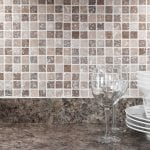Choosing the best countertop material is one of the most important decisions you’ll make if you’re planning a kitchen renovation.
Countertops remain America’s favorite feature to replace during a kitchen remodel — with
93% of kitchen projects including them, according to the 2019 Houzz U.S. Kitchen Trends Study.
And while there are lots of high quality materials to choose from, for many homeowners the debate centers on the two most popular: quartz versus granite.
Over the past few years, quartz has ended granite’s once rock-solid hold atop the leaderboard. Nearly half (48%) of surveyed homeowners went with with quartz for their kitchen remodel. Natural stone, which includes granite, has slipped to second place but remains strong as the choice of 43%.
But which one is best for your kitchen? Let’s take a look at a few factors to help you decide.
#1: Material
First, you’ll want to think about where each material comes from and how it’s made.
- Quartz is a hard stone that occurs naturally. It is crushed and mixed with a special resin to make the engineered quartz countertops we see in our homes. The result is a smooth, polished surface that’s durable and easy to maintain.
- Granite is also a 100% natural material and produces highly durable countertops. Because it’s cut directly from the ground, each granite slab looks unique, which adds a naturalistic feel to the kitchen.
#2: Appearance
With a uniform look and wide variety of colors available, quartz has gained in popularity thanks in part to its stunning beauty. However, some still consider the naturally-occurring variations in granite slabs to be a plus.
- Pigments may be added to the mixture of crushed quartz and resin, for an almost endless array of color choices. Standardized fabrication methods give the countertops a formal, consistent appearance that appeals to many homeowners.
- Natural granite contains quartz, mica and other minerals that give the rock its familiar flecked, multi-colored appearance. Only natural colors are available — including off-white, black and green — which means less choice than with quartz.
#3: Durability
Quartz and granite are both durable materials that stand up well to chipping and cracking.
- Quartz is less prone to breaking during installation. However, it is not scratch proof and scratches may be more visible than with granite.
- Although it can take a lot of abuse, granite may chip when hit by hard objects and should not be used as a cutting surface. Rounded edges may reduce the risk of chipping.
#4: Basic Maintenance
Both materials respond well to simple day-to-day care. However, quartz is generally easier to maintain than granite, which requires re-sealing on a regular basis.
- Cleanliness
- Engineered quartz is a non-porous material with antibacterial properties.
- As a porous rock, granite may harbor bacteria and must be sealed and cleaned regularly to reduce exposure to pathogens.
- Moisture resistance
- Because it is nonporous, quartz doesn’t absorb moisture, so spills clean up easily. Homeowners should wipe quickly to avoid discoloration.
- Granite resists moisture when properly sealed, but the sealant wears down and must be reapplied on a regular basis. Clean up spills promptly and wash with mild soap and water in between sealings.
- Stain resistance
- Consumer Reports found that both quartz and granite perform well against most stains, including hot vegetable oil, hot coffee, chocolate syrup and grape juice.
- However, quartz was the clear winner on some substances including beet juice and food dye.
- Heat resistance.
- Quartz tolerates temperatures up to 150° Fahrenheit, but the resin may discolor from higher temperatures.
- Granite stands up to higher temperatures and will not discolor when touched by a hot pan.
- For both materials, use a trivet or hot pad to reduce the risk of cracking.
#5: Cost
Quartz was once the more expensive option, but production improvements have yielded significant cost savings. Today, granite is somewhat more expensive on a cost-per-square foot basis.
Because no two projects are alike, your exact cost will vary depending on a few factors, including:
- Tiles or slabs. All quartz countertops are made in slabs. Granite can be installed as tiles or slabs, with tiles being less expensive.
- Thickness. Regardless of the material you choose, your countertops will be more expensive the thicker they are. Counters typically range from ¾” to 1 ¼”.
- Color. For engineered quartz, some pigments are considered more upscale and may raise the price of your countertops. Granite slabs in hard-to-find colors are generally more expensive, while more frequently occuring colors cost less.
Not sure which one you should go with?
Contact Elite Renovations and Design. We’ll help you select the best materials and provide a free quote for your kitchen remodel!





